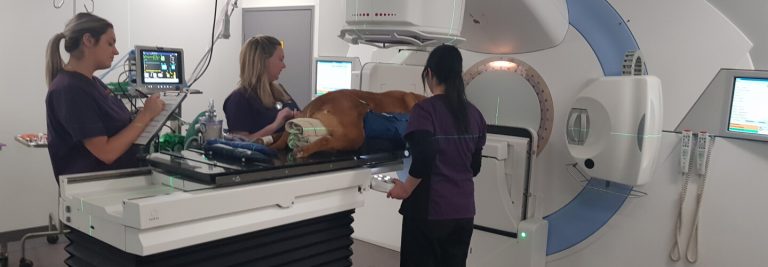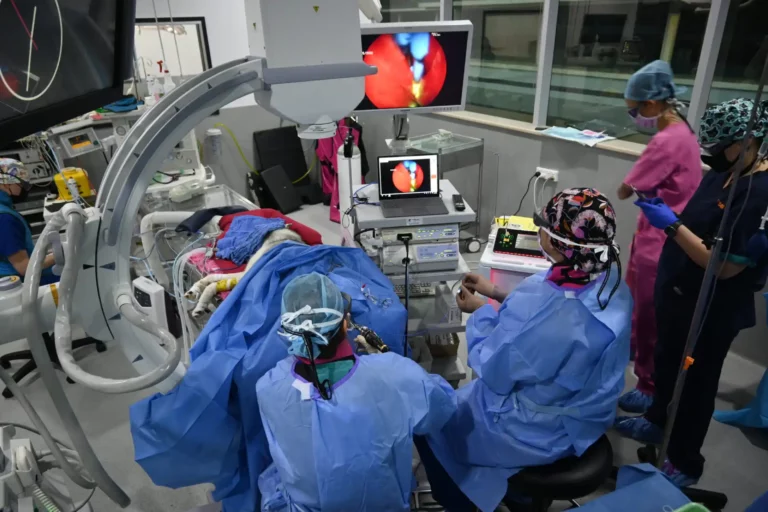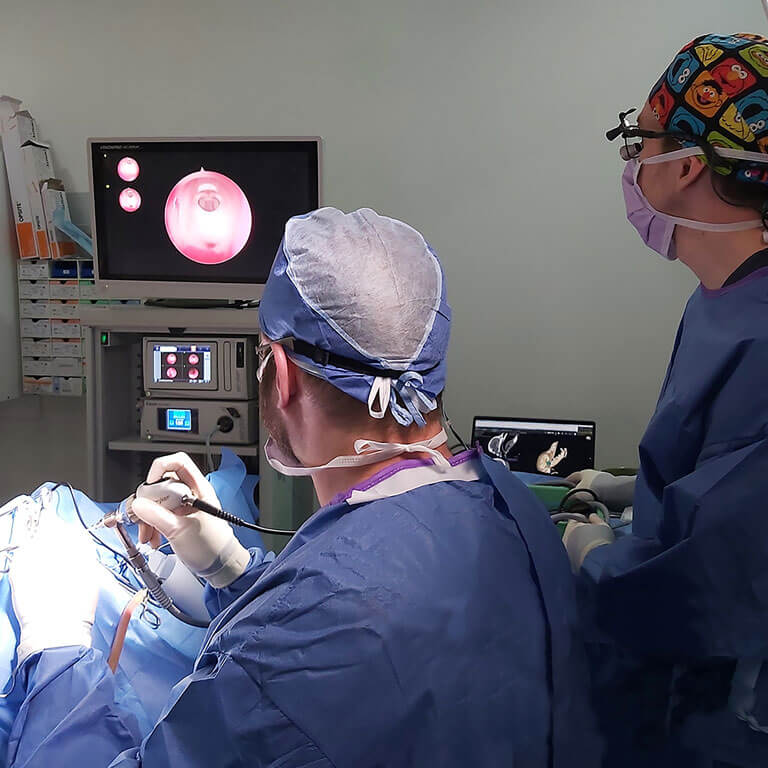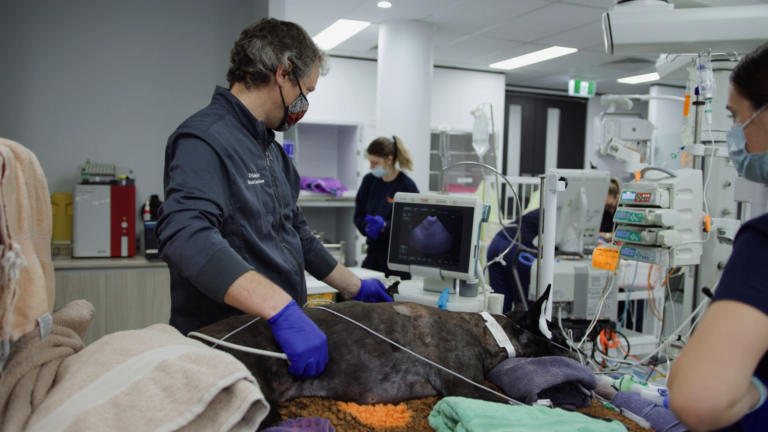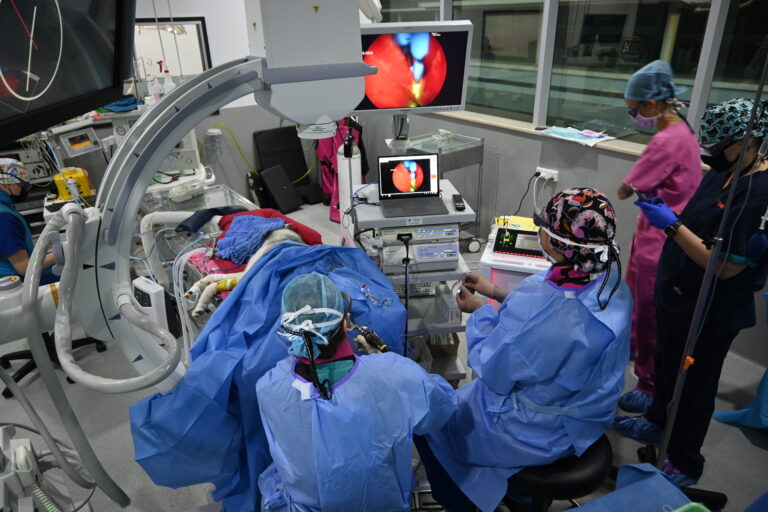What is a veterinary specialist?
Like in human medicine, veterinarians can also specialise in specific fields through additional training and study. This can be in a number of different fields such as:
- Critical Care – treatment of patients who are at death’s door, with life threatening conditions (including emergencies)
- Surgery – repair and treatment of conditions through physical interventions, often by cutting into the body. A Specialist Surgeon is trained in assessing whether a surgery is truly in the best interest of the patient.
- Internal medicine – diagnosis and management of complex diseases related to one or more internal organ systems
- Medical, radiation & surgical oncology – management and treatment of cancer using chemotherapy, radiation, and/or surgery
- Dermatology – treatment of skin, fur, and ear conditions
- Ophthalmology – treatment and surgery of eye conditions
- Sports medicine & rehabilitation – treatment of muscular or skeletal conditions without surgery. This can include sports performance, the management of injury and age related issues, or recovery from surgery.
- Neurology & neurosurgery – treatment and surgery of diseases to do with the brain, spinal cord, and muscles (all part of the nervous system)
- Avian & Exotics – veterinary specialists dealing with species that are not dogs or cats (eg. birds, reptiles, rabbits, etc). These specialties can be broken down into more specific species such as Avian Specialist
- Diagnostic imaging – acquiring and interpreting medical images (e.g. X-ray, CT, ultrasound, and MRI) to assist with diagnosis and treatment
- Anaesthesia – experts in pain relief and management (particularly during surgery), focusing on patient comfort and welfare. Anaesthetists help provide the safest sedation and anaesthetic options for each individual based on their medical condition
- Pathology – determining the cause and nature of diseases by examining and testing body tissues, cells, and fluids
To become a Specialist, a veterinarian must complete intensive training through a recognised institution (such as SASH), and complete a series of exams through a veterinary board or college, which oversees veterinarians in a given geography and discipline. This is where the term “Boarded Specialist” or “Board-Certified” comes from, indicating that the vet has undergone and necessary training and has passed their exams to be officially recognised as a specialist.
What training is required to be a veterinary specialist?
The pathway to specialisation is lengthy and tough. Generally, it follows this process:
- Graduate with a Doctorate of Veterinary Medicine (or equivalent). After this, the individual can officially be called a veterinarian, is awarded the title of Doctor, and be permitted to practice (usually 6 years with undergraduate studies). At this point, the individual may also be referred to as a “Veterinary Surgeon”, this should not be confused with a “Specialist Surgeon”
- After graduation, many veterinarians will choose to work in general practice and/or emergency practice, but this is not essential (variable time frame)
- Be selected to undertake internships with a recognised institution (eg. SASH). During this training period, the veterinarian is referred to as an Intern (1 to 2 years)
- Be selected to undertake a residency program within a specific field of specialisation, in a recognised institution. During this training period, the veterinarian is referred to as a Resident (usually 3 years)
- Complete residency, but before passing their Board exams, the veterinarian becomes a Registrar (variable time frame)
- Pass Board exams, have publications accepted in scientific journals, and to fulfill all administrative requirements to be called a Specialist (typically a total of 10 years of training to achieve this title)
What is a Boarded Vet?
A vet who is Boarded in a discipline (eg. Boarded in Internal Medicine), is someone who has undergone all the training requirements and passed all exams required to become a Specialist. Internationally, in the veterinary hierarchy, a veterinarian boarded in a discipline is regarded as being equal to a specialist of the same discipline. As such, the terms are used interchangeably. However, in Australia, to be able to legally use the term “Specialist”, you must also fulfill administrative requirements to be registered with the Australian Veterinary Board. There are situations, where individuals have completed and passed their training, but have not yet, or chosen not to be registered locally, meaning they are prohibited from formally using the term “Specialist” in Australia. Examples include those who have trained overseas, or those who have recently moved into practice from an educational/research setting. The registration process can take some time.
What is a Veterinary Intern?
It is a myth that Interns are un- or underqualified. The misconception possibly stems from the human medical field or some university veterinary hospitals, where all Interns are those who have just graduated, or those that have not yet graduated from university. All Interns at SASH are full fledged veterinarians, often with many years of general or even emergency practice experience. Although not as knowledgeable about a specialist field compared to a Specialist, an Intern is nevertheless a veterinarian with a broad set of skills. At SASH all Interns are under the mentorship and supervision of Specialists and Registrars.
SASH internships are divided into two categories – rotating internships and specialty internships. Generally, when a vet decides to specialise, they first complete a rotating internship, exposing the vet to various areas of specialty training. Those completing specialty internships will be trained in only one specialist field.
What is a Veterinary Resident?
A Resident is a vet who has committed to becoming a Specialist in one field. This is often commenced after a specialty internship. Competition for residency positions around the world is fierce, and many veterinarians are not successful in their first attempt to secure a position. Residency training programs are grueling and only select a high performing cohort of veterinarians who have displayed outstanding talent and skill in that specialist field. The strict selection criteria and rigorous training program ensures that only the most skilled and dedicated vets complete the program. Residency usually involves elements of clinical research, which must then be accepted into a scientific journal in order for the individual to become a Specialist. Many residencies also include TRDs (training in related disciplines), where the Resident spends time with specialists in other complementary specialist fields. E.g. an internal medicine residency may include some oncology training.
Although more knowledgeable than Interns, Residents are still under the supervision and mentorship of Specialists and Registrars. Depending on the program, Residents may also have to pass exams to progress further into senior stages of their residency.
What is a Veterinary Registrar?
A Registrar is a senior vet, typically one who has completed their residency training. These vets have proven themselves in their selected area of specialisation. However, they have not yet passed their Board exams and/or have not yet had their scientific articles accepted by a journal. Examination periods are scarce and depending on the program, must even need to be taken overseas. The review process for publishing in a scientific journal can also be lengthy, with some journals having strict selection criteria for acceptance. For these reasons, some Registrars have to wait, and may retain their Registrar title for an extended period.
Can a vet have more than one specialty?
Some veterinary Specialists have two areas of interest and can choose to specialise in two fields. Known as “double boarded” these Specialists often select complementary areas, and must complete two sets of residencies and exams. For this reason, you may come across one person with two titles, eg. Internal Medicine Specialist and Critical Care Resident, indicating they are at different points of their double boarding process.
Can a vet train more after becoming a Specialist?
Becoming a veterinary Specialist is not always the end of the journey for some vets. Instead of choosing a second specialty, others choose to dive deeper into the area they have already specialised in. This additional qualification is sometimes referred to as “sub-specialisation”, although there is no official title of “Sub-Specialist”. Examples include an Internal Medicine Specialist achieving additional qualifications into a specific organ system, such as nephrology (kidneys). Or a Surgical Specialist receiving qualifications in one specific type of surgery, such as Surgical Oncology (removal of cancers and tumors).
SASH Specialists
Because SASH is a specialist hospital, the depth of knowledge possessed by any one individual is immense. However, it is not possible to have a great depth and breadth of knowledge – no-one can know everything about everything. This is why SASH vets work together in cross functional teams to ensure that complex cases that involve multiple areas of specialties have the collective skills of multiple Specialists to provide the best possible care. For example, if a dog was hit by a car, a possible approach may be:
- First aid provided by an Emergency Veterinarian
- CT scan performed and interpreted by a Specialist in Diagnostic Imaging
- Surgery performed by a Specialist in Surgery while a Specialist in Anesthesia oversees the anaesthesia
- Recovery monitored by a Specialist in Critical Care
- Rehabilitation performed by a Rehab Veterinarian
Together with all the dedicated nurses and therapists, SASH is fortunate to have all these services under one roof, with each team working as one to provide a world class standard of care.
